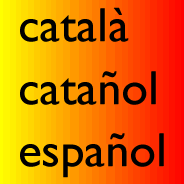This week I’ve been gathering data for a project comparing the colour vocabulary of Welsh/English bilinguals and monolingual English speakers. The aims of the project are to find out which colour words people know, which order they name them in, and whether the bilinguals name different colours in Welsh and English. All I have to do now is write a 5,000 word report on this data. Unfortunately the colours data collected online is not useable for this project, but I’m very grateful to those of you who completed the questionnaire.
It came as no surprise that there are more words for colours in English than in Welsh – I already suspected that. Most of the bilingual participants listed only basic colour words in Welsh, but one did come up with one I hadn’t heard before – gwinau, which means bay, auburn, brown or sepia and is usually used to describe the colour of horses. The same participant mentioned that there are a number of other words used to describe the colour of horses but couldn’t think of them. I found melynell (bay), llwyd-ddu (dun), brith / brithlwyd (piebald) and broc / brych (roan).
The basic colour words in Welsh are:
black – du
white – gwyn
red –coch
yellow – melyn
blue – glas
green – gwyrdd / glas
brown – brown / gwinau / cochddu (red/black) / dugoch (black/red)
purple – porffor / cochlas (red/blue) / glasgoch (blue/red)
pink – pinc / gwyngoch (white/red)
orange –oren / melyngoch (yellow/red)
grey – llwyd
The colour glas can mean blue (sky), green (grass), grey (sea), silver (coins) or transparent (saliva) depending on the context. The same word is found in all the other Celtic languages and has a similar meaning. Llwyd is also used to refer to brown paper.
Participants also mentioned arian (silver), aur (gold), piws (puce/purple), fioled (violet) and indigo. Another word for the latter two is dulas (black/blue).
The compounds are not commonly used, as far as I can tell, and none of the participants in this survey mentioned them.
I managed to find a number of other Welsh words for colours:
amber – melyn-goch / ambr
auburn – gwinau / coch / melynwyn / llwydwyn
azure – asur / glas
beige – beis
bronze – efydd
cream – hufen
crimson – coch / rhuddgoch / rhudd / purgoch / fflamgoch
cyan – gwyrddlas
fawn – llwyd olau
magenta – magenta / majenta
maroon – cochddu / marŵn
mauve – piwswyn / porffor gwelw / porffor golau
puce – piws / glasgoch
russet – lwytgoch
scarlet – ysgarlad / coch golau
sepia – gwinau / cochddu
tan – melyngoch
tawny – melynddu
I plan to add a new section on colours to Omniglot and have start collecting colour words in various languages. So could you send me all the colour words you can think of in the language(s) you know?
